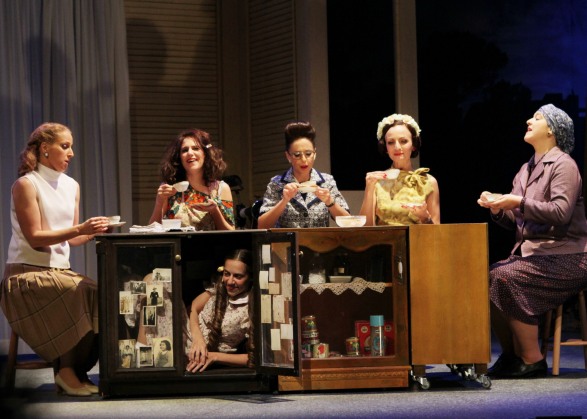Between Israelis from here, and Jews from there, the unspoken question marks the divide: “Why didn’t you come before the war?” Many arrived with nothing save their European manners and painful memories, ill-equipped to cope with the harsh circumstances of life in a nascent state recovering from the chaos and trauma of two wars. It was an awkward encounter between the imperative to preserve what remained of European Jewry and the clash between the two cultures; bound together by history and a mutual lack of enthusiasm.
It’s not something we really like to talk about in Israel, and it is perhaps not too surprising that Lizzie Doron, an author whose novels have been translated into several languages (although as yet not available in English), chosen in 2008 by French Vogue as one of seven most influential Israeli authors, has for the most part received a somewhat subdued reception here. Beer Sheva Theatre’s excellent production of Doron’s novel Why Didn’t You Come Before the War, adapted by Eynat Baranovksy and directed by Hagit Rehavi Nikolayevsky brings the story to vivid life with wit, humor and . A superb cast and creative merging of song and movement create an emotional theatrical experience that draws the viewer closer to the lives and emotions of its characters.

In a story that in less able hands might easily fall into stereotypes and melodrama, Rehavi Nikolayevsky has created a series of scenes that reveal the characters and their situation through an artistic filter. The aesthetic and comic aspects of the production situate the events in a past that is at once nostalgic, realistic and imagined.
The play unfolds from the perspective of Elizabeth (Yael Eitan), the only child of Helena (Shiri Golan), a Holocaust survivor. Although her home is full of secrets (Helena refuses to discuss the past) and strange customs, Elizabeth is not so very different from the other children in the impoverished South Tel Aviv neighborhood. As her friend Gadi (Avihud Tidhar) says: “All the mothers are crazy here.”
Seen through the eyes of a curious child, Helena and her friends (Avital Pasternak, Michal Brand, Sigalit Fuchs, Michal Weinberg) are at once mysterious and comic. If at first the characters are perceived as somewhat absurd, scene by scene, image by image, one comes to know more about their story, the audience’s knowledge and involvement growing as Elizabeth moves from childhood into her teens.
Judith Aharon’s costumes are distinct in their style, reflecting each woman’s character and impact of the past on the present just a hint of comic exaggeration, with Helena set apart visually from her colorful friends in cool cream and beige. The set, designed by Svetlana Breger conveys a sense of the period and the importance of memory with a few select touches: clothing hanging on the line, small cupboards filled with symbolic objects, an old fashioned sewing machine, and the all-important radio. Period music consultant Eran Litvin and Music Editor Shay Ben Jacob have created a soundtrack that fulfills a vital function in the play, with songs and commercial jingles evoking the period as well as news broadcasts. Anyone who lived in Israel during the years after WWII was well acquainted with the radio broadcasts devoted to searches for relatives. All conversations would cease as every ear tensed, hoping to pick up the vaguest hint that a loved one might still be alive somewhere.
Shiri Golan is an exceptional actress who conveys the character of Helena in all her contradiction and complex layers. Competent and often cynical, wanting to give her daughter the best, as she, Helena defines what is best. Helena is always in control. Her feelings tightly reigned in; wanting to protect her from the horrors of the past she creates an emotional distance. Yet beneath the thin veneer of her cool exterior lies a dark abyss of emotion. At one crucial moment in the play, after a struggle with Elizabeth that calls up all the demons of the past, Helena’s whole body seems to go slack. It is as though once she lets go of all the pain, fear and rage that is held in so tightly, she is hollow, empty – and yet she endures.
Yael Eitan is fresh and lovely as Elizabeth, presenting a credible and endearing image of a girl growing up between two worlds, trying to make sense of the strange adults in her life, while learning to make her own choices.
The bizarre choreography of porcelain coffee sets and yahrzeit (memorial) candles, the rituals of pain and survival, are seen from a distance, yet ultimately evoke not only empathy, but admiration for the courage and resilience of Helena and others like her.
Why Didn’t You Come Before the War
Based on the book by Lizzie Doron (Israel 1998), play by Eynat Baranovsky
Directed by Hagit Rehavi Nikolayevsky
Set Design: Svetlana Breger
Costume Design: Judith Aharon
Lighting Design: Adi Shimrony
Musical Editor and Original Music by: Shai Ben Jacob
Choreography by: Amit Zamir
Period Music Consult: Eran Litvin
Cast: Shiri Golan-Rotenberg, Yael Eitan, Avital Pasternak, Michal Brand, Sigalit Fuchs, Michal Weinberg, Danny Isserles, Yuval Karni, Avihud Tidhar, Rotem Keshet





